List of presidents of Bolivia
This article contains a list of presidents of Bolivia, from the Declaration of Independence after the conclusion of the War of Independence (1825) to the present day.
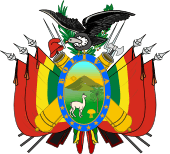 |
|---|
| This article is part of a series on the politics and government of Bolivia |
|
Presidency
|
|
Legislative
|
|
Judiciary
|
|
|
|
|
Background
The origins of Bolivia are trackables to Chuquisaca Revolution of 1809 in Upper Peru,[1] followed by La Paz revolution within the same year, which was part of the Latin American wars of independence against Spanish colonial governments. Despite other struggles for independence, the insurgents immediately formed a constitutional government who rejected any oath or compromise with Spain. The rebel government also integrated all parts of population, including mestizos and indigenous. However, by the early 1810, the rebels were defeated, with their leaders executed or hunted down, leaving the neighboring countries of Peru and Argentina to fight for the controls of the Upper Peru areas.[2]
In early 1825, General Antonio José de Sucre led his army to Upper Peru after his triumph in the Battle of Ayacucho on 9 December 1824, which ended the Spanish rule over Peru, entering La Paz on 9 February 1825. After his arrival, he issued a decree considered the milestone of Bolivian independence, calling a "General Assembly of Deputies of Upper Peru" in the town of Oruro (then moved to Chuquisaca, present-day Sucre) to clarify the political status of the province.[3] On 6 August 1825, the representatives voted for three alternatives: annexation to Peru, annexation to Argentina or full independence and establishment of a republican state.[4] The large majority of deputies opted for independence, and Upper Peru was declared a country in the same day. The General Simón Bolívar was deeply popular in the region, and was immediately elected by the General Assembly as President. To honor who was considered one of the great libertadores, the delegates chose to name Upper Peru as "Republic of Bolívar", changing it into Bolivia in 3 October 1825, echoing the delegate Manuel Martín Cruz who stated "If to Romulus, Rome; to Bolívar, Bolivia" (Si de Rómulo, Roma; de Bolívar, Bolivia).[5]
List
| Portrait | President (Birth–Death) |
Term | Party | Form of entry Form of exit |
Vice President | ||
|---|---|---|---|---|---|---|---|
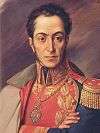 |
Simón Bolívar (1783–1830) |
6 August 1825 – 29 December 1825 |
Independent | Elected by the General Assembly. Resigned from office. |
Office blank 1825–1828 | ||
| Antonio José de Sucre (1785–1830) |
29 December 1825 – 18 April 1828 |
Independent | Elected by the Constituent Congress. Resigned from office. | ||||
| From 18 April to 2 August 1828, the presidency was fullfilled by José María Pérez de Urdininea. | |||||||
| From 2 August to 18 December 1828, the presidency was fullfilled by José Miguel de Velasco Franco. | |||||||
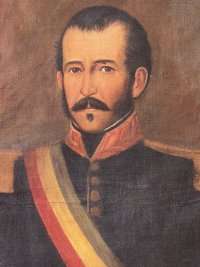 |
Pedro Blanco Soto (1795–1829) |
18 December 1828 – 1 January 1829 |
Independent | Elected by the Constituent Congress. Assassinated in office. |
José Ramón de Loayza | ||
| From 1 January to 24 May 1829, the presidency was fullfilled by José Miguel de Velasco. | |||||||
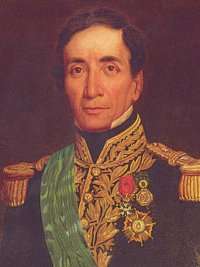 |
Andrés de Santa Cruz (1792–1865) |
24 May 1829 – 17 February 1839 |
Independent | Elected by the Constituent Congress. Protector of the Peru–Bolivian Confederation (1836–39) Resigned from office and fled Bolivia. |
José Miguel de Velasco (Before 1835) | ||
| Mariano Enrique Calvo (Since 1835) | |||||||
 |
José Miguel de Velasco (1795–1859) |
22 February 1839 – 10 June 1841 |
Military | Installed by a coup d'état. Elected by the Constituent Congress. Resigned from office. |
Office blank 1839–1880 | ||
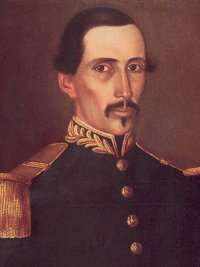 |
Sebastián Ágreda (1795–1875) |
10 June 1841 – 9 July 1841 |
Military | Installed by a coup d'état. Elected by the Constituent Congress. Resigned from office. | |||
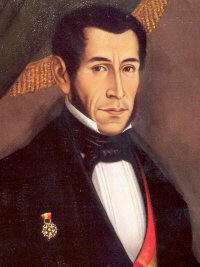 |
Mariano Calvo (1782–1842) |
9 July 1841 – 22 September 1841 |
Independent | Nominee by Sebastián Ágreda. Deposed by a coup d'état. | |||
 |
José Ballivián (1805–1852) |
27 September 1841 – 23 December 1847 |
Military | Installed by a coup d'état (1841). Elected by the Constituent Congress (1843). Resigned from office. | |||
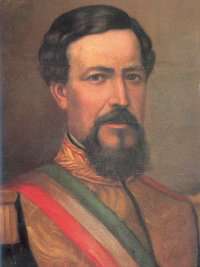 |
Eusebio Guilarte (1805–1849) |
23 December 1847 – 2 January 1848 |
Military | Succeeded to office according Constitutional laws. Deposed by a coup d'état. | |||
 |
José Miguel de Velasco (1795–1859) |
18 January 1848 – 6 December 1848 |
Military | Installed by a coup d'état. Deposed by a coup d'état. | |||
 |
Manuel Isidoro Belzu (1808–1865) |
6 December 1848 – 15 August 1855 |
Military | Installed by a coup d'état. Resigned from office. | |||
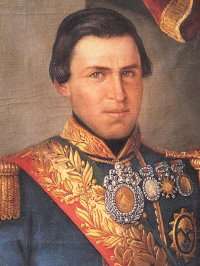 |
Jorge Córdova (1822–1861) |
15 August 1855 – 9 September 1857 |
Military | Elected by popular vote (1855). De facto governing with military's assistance. Declared deposed by Linaristas (9 September). Defeated by insurgents and fled (27 September). | |||
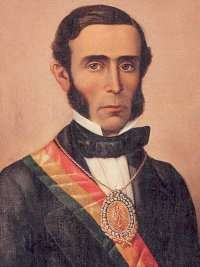 |
José María Linares (1808–1861) |
9 September 1857 – 14 January 1861 |
Constitutional | Elected by the National Congress (Linaristas). Deposed by a coup d'état. | |||
| From 14 January to 4 May 1861, the presidency was fullfilled by a transitory triumvirate. | |||||||
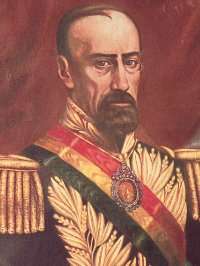 |
José María de Achá (1810–1868) |
4 May 1861 – 28 January 1864 |
Military | Installed by a coup d'état (1861). Elected by popular vote (1862). De facto governing with military's assistance. Deposed by a coup d'état. | |||
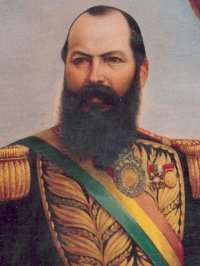 |
Mariano Melgarejo (1820–1871) |
28 January 1864 – 15 January 1871 |
Military | Installed by a coup d'état. Deposed by a coup d'état. | |||
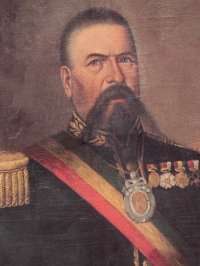 |
Agustín Morales (1808–1872) |
15 January 1871 – 27 November 1872 |
Military | Installed by a coup d'état. Assassinated in office. | |||
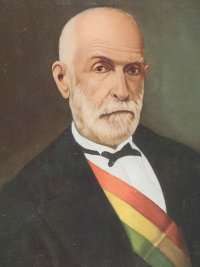 |
Tomás Frías Ametller (1804–1884) |
27 November 1872 – 9 May 1873 |
Constitutional | Succeeded to office according Constitutional laws. End of the term. | |||
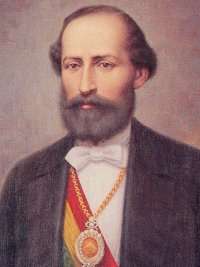 |
Adolfo Ballivián (1831–1874) |
9 May 1873 – 31 January 1874 |
Constitutional | Elected by popular vote (1873). Died in office. | |||
 |
Tomás Frías Ametller (1804–1884) |
31 January 1874 – 4 May 1876 |
Constitutional | Succeeded to office according Constitutional laws. Deposed by a coup d'état. | |||
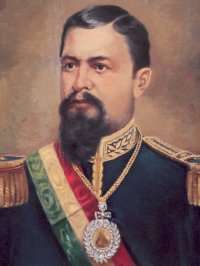 |
Hilarión Daza (1840–1894) |
4 May 1876 – 28 December 1879 |
Military | Installed by a coup d'état. Declared deposed during his absence (War of the Pacific) | |||
| From 28 December 1879 to 19 January 1880, the presidency was fullfilled by the presidential cabinet. | |||||||
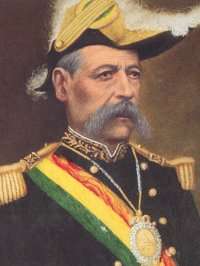 |
Narciso Campero (1813–1896) |
19 January 1880 – 4 September 1884 |
Liberal | Elected by the National Congress. End of the term. |
Aniceto Arce (First Vice President) | ||
| Belisario Salinas (Second Vice President) | |||||||
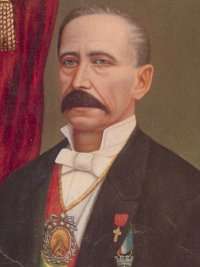 |
Gregorio Pacheco (1823–1899) |
4 September 1884 – 15 August 1888 |
Democratic | Elected by popular vote (1884). End of the term. |
Mariano Baptista (First Vice President) | ||
| Jorge Oblitas (Second Vice President) | |||||||
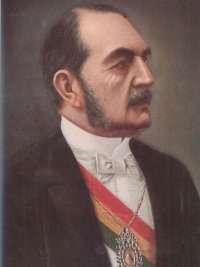 |
Aniceto Arce (1824–1906) |
15 August 1888 – 11 August 1892 |
Conservative | Elected by popular vote (1888). End of the term. |
José Manuel del Carpio (First Vice President) | ||
| Serapio Reyes Ortiz (Second Vice President) | |||||||
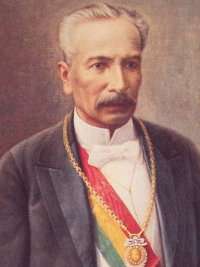 |
Mariano Baptista (1832–1907) |
11 August 1892 – 19 August 1896 |
Conservative | Elected by popular vote (1892). End of the term. |
Severo Fernández (First Vice President) | ||
| Vacant (Second Vice President) | |||||||
 |
Severo Fernández (1849–1925) |
19 August 1896 – 12 April 1899 |
Conservative | Elected by popular vote (1896). Deposed by a civil war. |
Rafael Peña de Flores (First Vice President) | ||
| Jenaro Sanjinés (Second Vice President) | |||||||
| From 12 April to 25 October 1899, the presidency was fullfilled by a transitory triumvirate. | |||||||
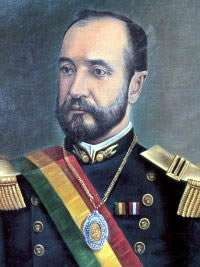 |
José Manuel Pando (1849–1917) |
25 October 1899 – 14 August 1904 |
Liberal | Installed after a civil war Elected by the National Congress. End of the term. |
Lucio Pérez Velasco (First Vice President) | ||
| Aníbal Capriles (Second Vice President) | |||||||
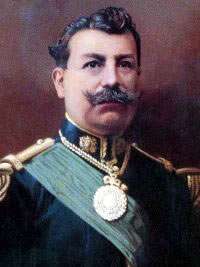 |
Ismael Montes (1861–1933) |
14 August 1904 – 12 August 1909 |
Liberal | Elected by popular vote (1904). End of the term. |
Eliodoro Villazón (First Vice President) | ||
| Valentín Abecia (Second Vice President) | |||||||
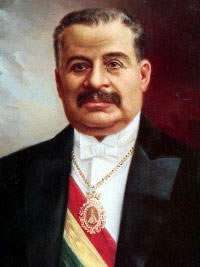 |
Eliodoro Villazón (1848–1939) |
12 August 1909 – 14 August 1913 |
Liberal | Elected by popular vote (1909). End of the term. |
Macario Pinilla (First Vice President) | ||
| Juan Misael Saracho (Second Vice President) | |||||||
 |
Ismael Montes (1861–1933) |
14 August 1913 – 15 August 1917 |
Liberal | Elected by popular vote (1913). End of the term. |
Juan Misael Saracho (First Vice President) | ||
| José Carrasco Torrico (Second Vice President) | |||||||
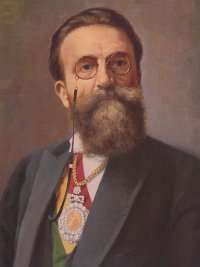 |
José Gutiérrez Guerra (1869–1929) |
15 August 1917 – 12 July 1920 |
Liberal | Elected by popular vote (1917). Deposed by a coup d'état. |
Ismael Vázquez Virreira (First Vice President) | ||
| José Santos Quinteros (Second Vice President) | |||||||
| From 13 July 1920 to 28 January 1921, the presidency was fullfilled by a transitory triumvirate. | |||||||
 |
Bautista Saavedra (1870–1939) |
28 January 1921 – 3 September 1925 |
PRS | Installed by a coup d'état (1920). Elected by the National Congress (1921). Resigned from office. |
Vacant | ||
| From 3 September 1925 to 10 January 1926, the presidency was fullfilled by the Senate President Felipe S. Guzmán. | |||||||
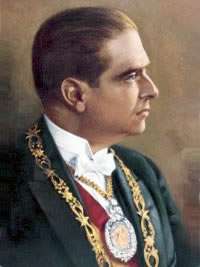 |
Hernando Siles (1882–1942) |
10 January 1926 – 28 May 1930 |
PRS (Before 1927) |
Elected by popular vote (December 1925). Resigned from office. |
Abdón Saavedra | ||
| PN (After 1927) | |||||||
| From 28 May 1930 to 5 March 1931, the presidency was fullfilled by the presidential cabinet (before 28 June 1930), then by General Carlos Blanco Galindo. | |||||||
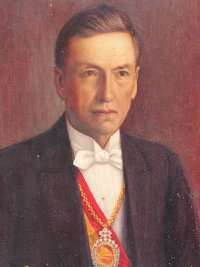 |
Daniel Salamanca (1869–1935) |
5 March 1931 – 1 December 1934 |
PRG | Elected by popular vote (1931). Resigned under military's threat. |
José Luis Tejada | ||
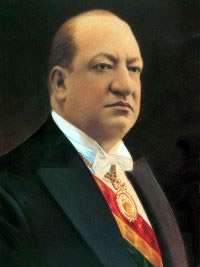 |
José Luis Tejada (1882–1938) |
1 December 1934 – 16 May 1936 |
PRG | Succeeded to office according Constitutional laws. Deposed by a coup d'état. |
Vacant | ||
| From 16 to 22 May 1936, the presidency was fullfilled by Major Germán Busch. | |||||||
 |
David Toro (1898–1977) |
22 May 1936 – 13 July 1937 |
Military | Installed by a coup d'état. Forced to resign from office. |
Vacant | ||
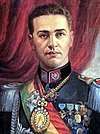 |
Germán Busch (1904–1939) |
13 July 1937 – 23 August 1939 |
Military | Succeeded to lead the military junta. Died in office. |
Vacant (Before 1938) | ||
| Enrique Baldivieso (Since 1938) | |||||||
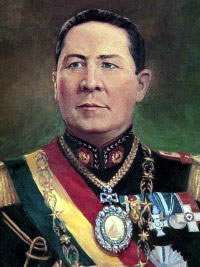 |
Carlos Quintanilla (1888–1964) |
23 August 1939 – 15 April 1940 |
Military | Succeeded to lead the military junta. Resigned from office. |
Vacant | ||
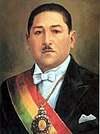 |
Enrique Peñaranda (1892–1969) |
15 April 1940 – 20 December 1943 |
Military | Elected by popular vote (1940). De facto governing with military's assistance. Deposed by a coup d'état. |
Vacant | ||
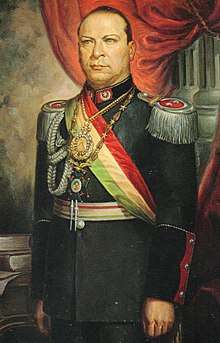 |
Gualberto Villarroel (1908–1946) |
20 December 1943 – 21 July 1946 |
Military | Installed by a coup d'état. Assassinated in office. |
Julián Montellano | ||
| From 21 July to 17 August 1946, the presidency was fullfilled by Attorney General Néstor Guillén. | |||||||
| From 17 August 1946 to 10 March 1947, the presidency was fullfilled by Supreme Court's Justice Tomás Monje. | |||||||
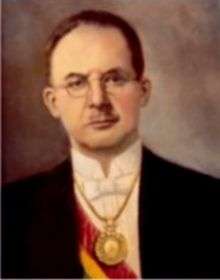 |
Enrique Hertzog (1897–1981) |
10 March 1947 – 24 October 1949 |
PURS | Elected by popular vote (1947). Resigned from office. |
Mamerto Urriolagoitía | ||
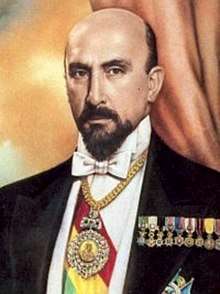 |
Mamerto Urriolagoitía (1895–1974) |
24 October 1949 – 16 May 1951 |
PURS | Succeeded to office according Constitutional laws. End of the term. |
Vacant | ||
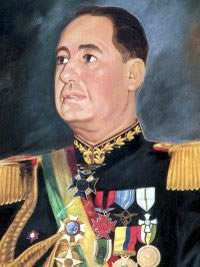 |
Hugo Ballivián (1901–1993) |
16 May 1951 – 11 April 1952 |
Military | Installed by Urriolagoitía's self-coup. Deposed by a popular sedition. |
Vacant | ||
 |
Víctor Paz Estenssoro (1907–2001) |
15 April 1952 – 6 August 1956 |
MNR | Elected by popular vote (1951). Installed by popular sedition (1952). End of the term. |
Hernán Siles | ||
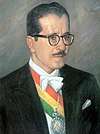 |
Hernán Siles (1914–1996) |
6 August 1956 – 6 August 1960 |
MNR | Elected by popular vote (1956). End of the term. |
Ñuflo Chávez Ortiz | ||
 |
Víctor Paz Estenssoro (1907–2001) |
6 August 1960 – 4 November 1964 |
MNR | Elected by popular vote (1960). Successfully re-elected (1964). Deposed by a coup d'état |
Juan Lechín Oquendo (Before 1964) | ||
| René Barrientos (Since 1964) | |||||||
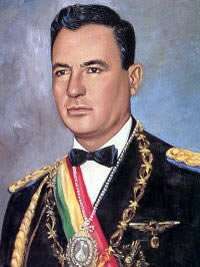 |
René Barrientos (1919–1969) |
5 November 1964 – 27 April 1969 |
MPC | Installed by a coup d'état (1964). Elected by popular vote (1966). Died in office. |
Alfredo Ovando Candía (Before 1966) | ||
| Luis Adolfo Siles (Since 1966) | |||||||
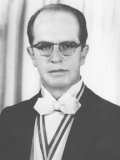 |
Luis Adolfo Siles (1925–2005) |
27 April 1969 – 26 September 1969 |
PSD | Succeeded to office according to Constitutional laws. Deposed by a coup d'état. |
Vacant | ||
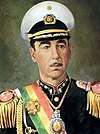 |
Alfredo Ovando Candía (1918–1982) |
26 September 1969 – 6 October 1970 |
Military | Installed by a coup d'état. Ousted from office by another coup attempt. |
Vacant | ||
| From 6 to 7 October 1970, the presidency was fullfilled by a military triumvirate. | |||||||
 |
Juan José Torres (1920–1976) |
7 October 1970 – 21 August 1971 |
Military | Installed by a counter-coup. Deposed by another coup d'état. |
Vacant | ||
| From 21 to 22 August 1971, the presidency was fullfilled by a military triumvirate. | |||||||
 |
Hugo Banzer (1926–2002) |
22 August 1971 – 21 July 1978 |
Military | Installed by a coup d'état. Resigned due to large political dissent. |
Vacant | ||
| On 21 July 1978, the presidency was fullfilled by the Chairman of the Military Junta Víctor González Fuentes. | |||||||
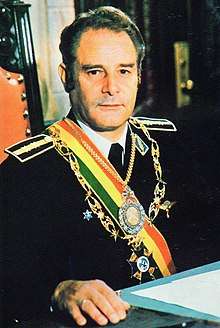 |
Juan Pereda (1931–2012) |
21 July 1978 – 24 November 1978 |
Military | Elected by popular vote (1978). De facto governing with military's assistance. Deposed by a coup d'état. |
Vacant | ||
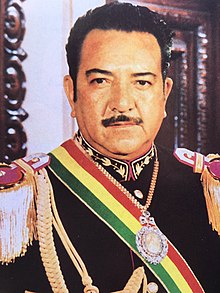 |
David Padilla (1927–2016) |
24 November 1978 – 8 August 1979 |
Military | Installed by a coup d'état. Dismissed after his successor's election. |
Vacant | ||
| Wálter Guevara (1912–1996) |
8 August 1979 – 1 November 1979 |
PRA | Elected by the National Congress (1979) Deposed by a coup d'état. |
Vacant | |||
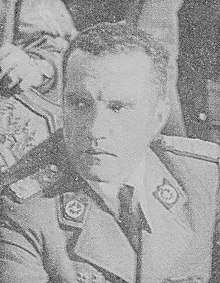 |
Alberto Natusch (1933–1994) |
1 November 1979 – 16 November 1979 |
Military | Installed by a coup d'état. Forced to resign under National Congress's pressure. |
Vacant | ||
| From 16 November 1979 to 17 July 1980, the presidency was fullfilled by the Chamber President Lidia Gueiler Tejada. | |||||||
| From 17 to 18 July 1980, the presidency was fullfilled by a military triumvirate. | |||||||
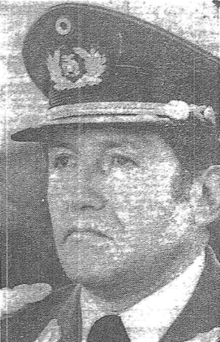 |
Luis García Meza (1929–2018) |
18 July 1980 – 4 August 1981 |
Military | Installed by a coup d'état. Deposed by another coup d'état. |
Vacant | ||
| From 4 August to 4 September 1981, the presidency was fullfilled by a military triumvirate. | |||||||
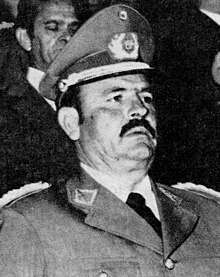 |
Celso Torrelio (1933–1999) |
4 September 1981 – 19 July 1982 |
Military | Selected by the military junta. Dismissed by military authorities. |
Vacant | ||
| From 19 to 21 July 1982, the presidency was fullfilled by a military triumvirate. | |||||||
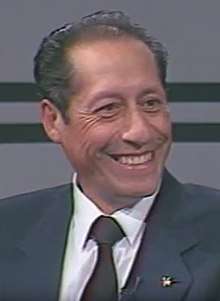 |
Guido Vildoso (1937–) |
21 July 1982 – 10 October 1982 |
Military | Selected by the military junta. Dismissed after completing the transition to democracy. |
Vacant | ||
 |
Hernán Siles (1914–1996) |
10 October 1982 – 6 August 1985 |
MNRI | Elected by popular vote (1980). Confirmed by the National Congress (1982) End of the term. |
Jaime Paz Zamora | ||
 |
Víctor Paz Estenssoro (1907–2001) |
6 August 1985 – 6 August 1989 |
MNR | Elected by popular vote (1985). End of the term. |
Julio Garrett Ayllón | ||
 |
Jaime Paz Zamora (1939–) |
6 August 1989 – 6 August 1993 |
MIR | Elected by popular vote (1989). End of the term. |
Luis Ossio | ||
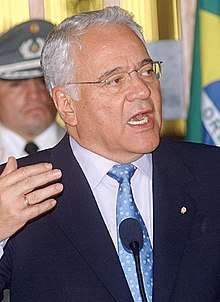 |
Gonzalo Sánchez de Lozada (1930–) |
6 August 1993 – 6 August 1997 |
MNR | Elected by popular vote (1993). End of the term. |
Víctor Hugo Cárdenas | ||
 |
Hugo Banzer (1926–2002) |
6 August 1997 – 7 August 2001 |
ADN | Elected by popular vote (1997). Resigned from office. |
Jorge Quiroga | ||
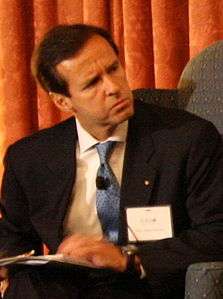 |
Jorge Quiroga (1960–) |
7 August 2001 – 6 August 2002 |
ADN | Succeeded to office according to Constitutional laws. End of the term. |
Vacant | ||
 |
Gonzalo Sánchez de Lozada (1930–) |
6 August 2002 – 17 October 2003 |
MNR | Elected by popular vote (2002). Resigned from office. |
Carlos Mesa | ||
.jpg) |
Carlos Mesa (1953–) |
17 October 2003 – 9 March 2005 |
MNR | Succeeded to office according to Constitutional laws. Resigned from office. |
Vacant | ||
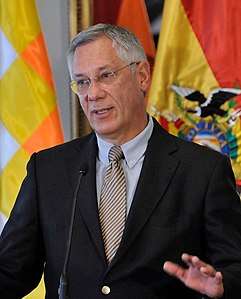 |
Eduardo Rodríguez (1956–) |
9 March 2005 – 22 January 2006 |
Independent | Succeeded to office according Constitutional laws. End of the term. |
Vacant | ||
_(cropped).jpg) |
Evo Morales (1959–) |
22 January 2006 – 10 November 2019 |
MAS | Elected by popular vote (2005). Successfully re-elected (2009, 2014). Resigned from office. |
Álvaro García Linera | ||
| From 10 to 12 November 2019, the office of President was vacant. | |||||||
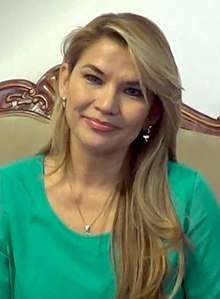 |
Jeanine Áñez (1967–)[6][7] |
12 November 2019 – Incumbent |
MDS | Succeeded to office according to Constitutional laws.[8] Interim President |
Vacant | ||
Timeline
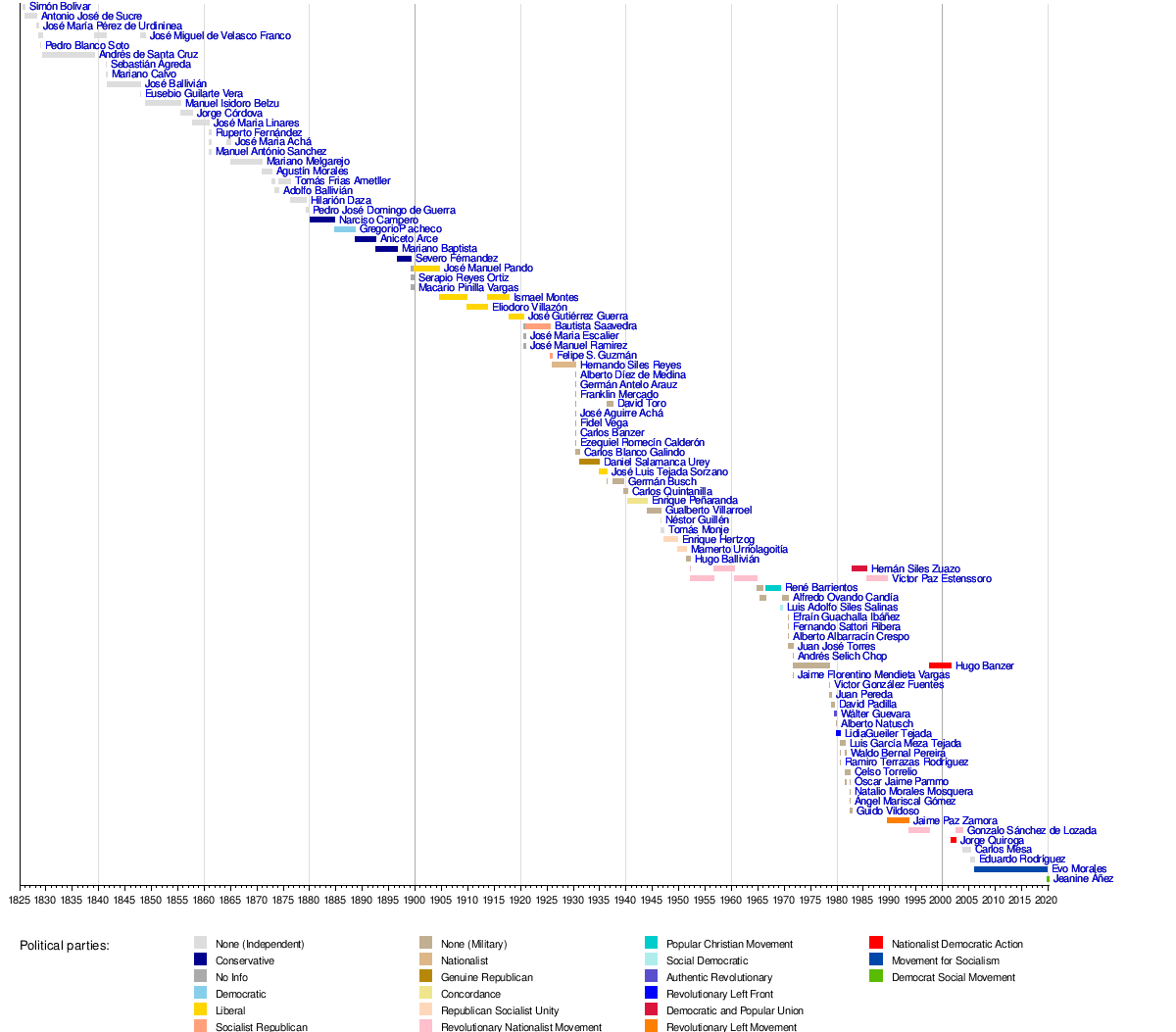
Living former presidents
As of 11 August 2020, there are seven living former presidents:

Guido Vildoso
(1982)
April 5, 1937
Jaime Paz Zamora
(1989–1993)
April 15, 1939
Jorge Quiroga
(2001–2002)
May 5, 1960
Gonzalo Sánchez de Lozada
(2002–2003)
July 11, 1930.jpg)
Carlos Mesa
(2003–2005)
August 12, 1953
Eduardo Rodríguez
(2005–2006)
March 2, 1956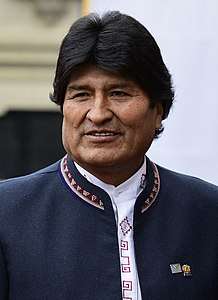
Evo Morales
(2006–2019)
October 26, 1959
References
- Notimérica, ed. (May 5, 2017). "La Revolución de Chuquisaca, 207 años del Primer Grito Libertario de América" (in Spanish).
- Biblioteca Virtual Miguel de Cervantes (ed.). "Doctrina del libertador/Simón Bolívar; prólogo Augusto Mijares; compilación, notas y cronología Manuel Pérez Vila" (in Spanish). Retrieved August 2, 2019.
- Urgentebo, ed. (August 9, 2016). "La independencia de Bolivia y el Decreto de 9 de febrero de 1825" (in Spanish).
- Quispe, Jorge (August 6, 2012). La Razón (ed.). "El 'país viable' que convenció a Bolívar" (in Spanish).
- Notimérica, ed. (September 4, 2018). "¿Por qué Bolivia se llama Bolivia?" (in Spanish).
- "La senadora Jeanine Áñez asumió la presidencia provisional de Bolivia tras la renuncia de Evo Morales" (in Spanish). Infobae. Retrieved 2019-11-12.
- "El MAS reconoce la sucesión por renuncia y abandono de funciones de Evo y Álvaro". Pagina Siete. November 20, 2019. Retrieved November 20, 2019.
- https://tcpbolivia.bo/tcp/?q=content/comunicado-1